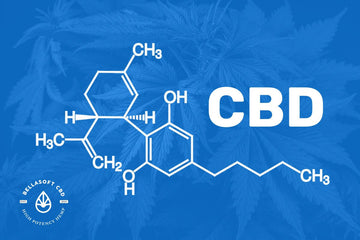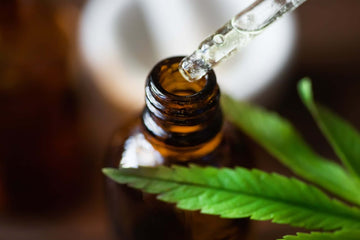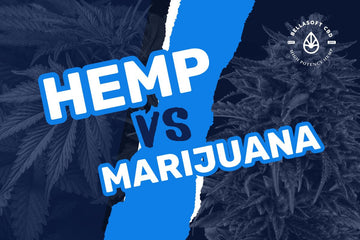Did you know that over 64 million Americans have tried cannabidiol (CBD)? At Bellasoft CBD, we're here to dive into why this natural remedy is gaining so much buzz. From easing anxiety to soothing chronic pain, CBD is transforming lives. Our latest blog post explores the science behind CBD, its benefits, and how to choose the right product for your needs. Whether you're a newbie or a seasoned user, we've got the insights you need to make informed decisions. Get ready to discover the power of CBD with Bellasoft CBD.
Key Takeaways
-
Understand CBD: Cannabidiol (CBD) is a non-psychoactive compound found in cannabis plants.
-
Mechanism of Action: CBD interacts with the body's endocannabinoid system to promote balance.
-
CBD vs THC: Unlike THC, CBD does not cause a "high" and has different effects on the body.
-
Potential Benefits: CBD may help with anxiety, pain relief, and sleep improvement.
-
Usage Methods: CBD can be consumed as oils, edibles, topicals, or vapes.
-
Safety First: Always consult a healthcare provider before starting CBD to avoid side effects.
-
Legal Status: The legality of CBD varies by location; check your local laws before purchase.
What is Cannabidiol

Cannabidiol Definition
Cannabidiol (CBD) is a chemical compound found in cannabis plants and is one of many cannabinoids. It belongs to a class of compounds known as cannabinoids, including those found in CBD Oil Tinctures and CBD Pet Care. These compounds interact with the body's endocannabinoid system. CBD is one of over 100 different cannabinoids identified in cannabis.
Unlike tetrahydrocannabinol (THC), CBD does not produce a "high." THC is the psychoactive component of cannabis. This makes CBD appealing for those seeking relief without mind-altering effects.
Non-Psychoactive Nature
CBD is non-psychoactive. This means it does not affect the mind or mental processes. Users do not experience euphoria or intoxication from CBD alone. This property distinguishes it from THC, which can alter perception and mood.
Many people prefer CBD for its non-psychoactive nature. They use it to avoid the side effects associated with THC, which is one of the common questions about CBD. This has contributed to its growing popularity.
Increasing Popularity
The popularity of CBD has surged in recent years. People are increasingly using it for potential health benefits. Studies suggest that CBD may help with various conditions:
-
Anxiety
-
Chronic pain
-
Inflammation
-
Epilepsy
CBD products come in many forms. These include oils, capsules, edibles, and topical creams. The variety of products makes it accessible to a wide audience.
Therapeutic Potential of CBD: A Quick Overview
Research on CBD is ongoing. Early studies show promising results for several health issues. For example, the FDA approved a CBD-based drug called Epidiolex for epilepsy treatment. This approval highlights CBD's potential in managing severe medical conditions.
Many users report positive effects on anxiety and stress levels. Some find relief from chronic pain and inflammation. However, more research is needed to confirm these benefits conclusively.
Legal Status
The legal status of CBD varies by location. In some places, it is fully legal; in others, it remains restricted. The 2018 Farm Bill legalized hemp-derived CBD in the United States, provided it contains less than 0.3% THC.
Despite this, state laws can differ significantly. Consumers should check local regulations before purchasing or using CBD products.
How CBD Works: The Science Explored

Endocannabinoid System
CBD interacts with the body's endocannabinoid system (ECS). This system plays a crucial role in regulating various physiological processes. The ECS includes receptors, enzymes, and endocannabinoids.
Endocannabinoids are molecules produced by the body. They bind to cannabinoid receptors found throughout the body. These receptors are mainly of two types: CB1 and CB2.
Brain Receptors
CBD influences receptors in the brain. CB1 receptors are abundant in the brain and central nervous system, highlighting cbd benefits. These receptors affect mood, pain sensation, and appetite.
CBD does not bind directly to CB1 receptors. Instead, it modifies their ability to bind to other cannabinoids. This indirect interaction can reduce anxiety and depression symptoms.
Immune System
CBD also affects the immune system. CB2 receptors are primarily located in the immune cells. These receptors help regulate inflammation and immune responses.
By interacting with CB2 receptors, CBD may reduce inflammation. This can be beneficial for conditions like arthritis and multiple sclerosis.
Homeostasis
The ECS helps maintain balance in the body. CBD works by interacting with receptors in the endocannabinoid system to regulate functions like sleep, mood, appetite, and immune response. CBD supports this balance by interacting with ECS components.
Homeostasis is the body's way of keeping internal stability. When something disrupts this balance, the ECS works to restore it. CBD aids in maintaining homeostasis, promoting overall health and well-being.
Practical Examples
People use CBD for various health issues. For instance, someone with chronic pain might use CBD oil to manage their discomfort. Another person with insomnia could take CBD gummies to improve sleep quality.
These examples show how CBD's interaction with the endocannabinoid system (ECS) can provide relief. Each individual's experience may vary based on their unique needs and conditions.
CBD vs THC

Psychoactive Effects
THC is the psychoactive component of cannabis. It causes the "high" that people experience when using marijuana. On the other hand, CBD does not produce any psychoactive effects. This makes CBD a popular choice for those seeking therapeutic benefits without altering their mental state.
Body and Mind Impact
CBD and THC have different effects on the body and mind. THC binds with CB1 receptors in the brain, causing euphoria and altered sensory perception, highlighting cbd benefits. This can lead to changes in mood, memory, and cognition.
CBD interacts with both CB1 and CB2 receptors but does not bind strongly to them. Instead, it influences the body's endocannabinoid system indirectly. This helps regulate pain, inflammation, and anxiety without causing a high, highlighting the benefits of CBD.
Therapeutic vs Recreational Use
CBD is often used for therapeutic purposes. People use it to manage chronic pain, reduce anxiety, and improve sleep quality. It has also shown promise in treating epilepsy and other neurological disorders.
THC is primarily used recreationally due to its psychoactive effects. However, it also has medical applications. Some people use THC to stimulate appetite, reduce nausea, or alleviate severe pain, highlighting the benefits of CBD.
Potential Benefits of CBD
Reducing Anxiety
CBD may help reduce anxiety. Many people experience anxiety daily. Studies show that CBD can calm the nervous system. It interacts with receptors in the brain. These receptors control mood and stress levels. CBD can lower cortisol levels, which is a stress hormone. This helps people feel more relaxed.
e users report feeling less anxious after taking CBD. They feel calmer in social situations. This could be useful for those with social anxiety disorder, potentially benefiting from the entourage effect.
Managing Chronic Pain
CBD is also known for managing chronic pain. Chronic pain affects millions of people. Traditional medications might not always work. CBD offers an alternative. It targets the body's endocannabinoid system (ECS). The ECS regulates pain and inflammation.
Studies have shown that CBD reduces inflammation in conditions like arthritis. It can also alleviate pain from injuries or surgeries. Some patients prefer CBD because it has fewer side effects than opioids.
Improving Sleep Quality
Sleep is essential for health. Poor sleep affects mood, energy, and overall well-being. CBD may improve sleep quality. It helps regulate sleep patterns by interacting with serotonin receptors.
Research suggests that CBD can reduce insomnia. People fall asleep faster and stay asleep longer. This is especially helpful for those with sleep disorders.
Ways to Use CBD

Oils and Tinctures
CBD oils and tinctures are popular. They come in small bottles with droppers. Users place a few drops under the tongue. This method is called sublingual application. It allows for quick absorption into the bloodstream.
Edibles
Edibles include gummies, chocolates, and beverages. They offer a tasty way to consume CBD. Ingestion through edibles takes longer to feel effects. The CBD passes through the digestive system first.
Topicals
Topicals are creams, lotions, and balms infused with CBD. People apply these directly to the skin. This method targets localized pain or inflammation. Topical application does not enter the bloodstream.
Sublingual vs Ingestion
Sublingual application involves placing CBD under the tongue. Absorption happens quickly through the mucous membranes. Effects can be felt within 15-45 minutes.
Ingestion requires swallowing CBD products like edibles or capsules. The digestive system processes them before reaching the bloodstream. This can take 30 minutes to 2 hours.
Topical Application
Topical application works differently from ingestion and sublingual methods. The CBD interacts with receptors in the skin. It does not reach the bloodstream but provides localized relief.
Importance of Dosage
Starting with a low dosage is crucial. Everyone's body reacts differently to CBD. Begin with a small amount and gradually increase it. This helps find the right dosage without adverse effects.
Safety and Side Effects
General Safety
CBD is generally considered safe for most people. Studies show that it has a good safety profile. Unlike THC, CBD does not cause a high. Many users report positive effects with minimal issues.
Possible Side Effects
e users may experience side effects. Common side effects include:
-
Dry mouth
-
Dizziness
-
Changes in appetite
Dry mouth can be uncomfortable but is usually mild. Dizziness may occur, especially with higher doses. Changes in appetite can vary; some feel hungrier while others lose their appetite.
Consult Healthcare Provider
It's important to talk to a healthcare provider before using CBD. They can provide personalized advice based on your health conditions. This is crucial if you take other medications. CBD can interact with certain drugs, affecting their efficacy.
Legality of CBD

Country and State Laws
CBD legality varies by country and state. In the United States, the 2018 Farm Bill legalized hemp-derived CBD. This means that CBD products containing less than 0.3% THC are legal at the federal level. However, individual states have their own regulations. Some states allow all forms of CBD, while others have strict restrictions.
In Europe, laws differ significantly. The European Union permits CBD with less than 0.2% THC. Yet, some countries like Slovakia ban all CBD products. In Asia, countries like Japan allow CBD but prohibit any THC content.
2018 Farm Bill Impact
The 2018 Farm Bill was a significant milestone for CBD in the U.S. It legalized hemp cultivation and removed hemp from the list of controlled substances. This bill opened doors for many companies to produce and sell hemp-derived CBD products legally.
Despite this federal legalization, states can still impose their own rules. For example, Idaho only allows CBD with zero THC. Consumers must understand these nuances to avoid legal issues.
Importance of Checking Local Laws
Before purchasing or using CBD products, always check local laws. Even within a single country, regulations can vary widely. For instance:
-
Some states require a prescription for CBD.
-
Others may limit the types of products available.
-
Certain areas might have age restrictions for buying CBD.
Failing to comply with local laws can result in penalties or confiscation of products.
Tips for First-Time Users

Start Low
Begin with a small dose of CBD. A low dose helps gauge your body's reaction. Experts suggest starting with 5-10 mg per day.
Gradually increase the dosage. Observe how your body responds. If needed, adjust slowly over time.
Keep a Journal
Track your CBD usage in a journal. Note the dosage, time of consumption, and effects felt.
Documenting this information helps identify patterns. It also aids in finding the optimal dosage for you, considering the entourage effect.
Reputable Sources
Purchase CBD from reputable sources. Look for brands with third-party lab testing.
Lab-tested products ensure quality and safety. They verify the absence of harmful substances like pesticides or heavy metals.
Understand Forms
CBD comes in various forms. These include oils, capsules, edibles, and topicals.
Choose a form that suits your lifestyle. For example, oils offer flexibility in dosing, while capsules provide convenience.
Consult Professionals
Consult a healthcare professional before starting CBD. They can provide personalized advice based on your health condition.
A doctor can help monitor progress and adjust dosages if necessary.
Ready to Discover the Wonders of CBD

CBD offers a lot of potential benefits, from easing anxiety to helping with pain. You now know the basics, how it works, and what to watch out for. Whether you're a newbie or looking to expand your knowledge, there's always more to learn.
Ready to dive deeper? Check out the Bellasoft Blog for more guides. If you found this helpful, share it with your friends! And don’t forget to explore our CBD Oils, Roll-Ons, Pet Care products, and Gummies. Happy exploring!
Frequently Asked Questions
What is CBD?
CBD, or cannabidiol, is a natural compound found in cannabis plants known as cannabinoids. It’s known for its potential therapeutic effects without causing a "high."
How does CBD work in the body?
CBD interacts with the endocannabinoid system (ECS) in the body, helping regulate functions like pain, mood, and sleep.
What are the main differences between CBD and THC?
CBD is non-psychoactive, meaning it doesn't cause a high. THC, on the other hand, is psychoactive and responsible for the high associated with cannabis.
What are the potential benefits of using CBD?
CBD may help alleviate anxiety, reduce pain, improve sleep, and support overall wellness. Research is ongoing to confirm these benefits.
What methods can I use to take CBD?
You can use CBD through oils, capsules, edibles, topicals, and vapes. Each method has different absorption rates and effects.
Is CBD safe to use?
CBD is generally considered safe but can cause side effects like dry mouth or drowsiness. Always consult with a healthcare provider before starting any new supplement.
Is CBD legal?
The legality of CBD varies by country and state. In many places, CBD derived from hemp with less than 0.3% THC is legal. Always check local laws.





